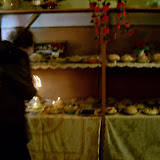It’s 5:00 a.m. here in Bulgaria. I’m sick. My throat has swollen to the size of a grain of rice and I am afraid because tomorrow my only form of communication will be written notes, in Bulgarian. I hate writing in Bulgarian.
It’s not that the Bulgarian alphabet is hard. Just the opposite. Unlike English, each letter corresponds to a different sound and that sound is always represented by the same letter. It’s a novel concept to most native English speakers. The problem is that after learning English for 23 years, my ability to differentiate sounds has been shot to Hell. Let me explain.
In Bulgarian, there are 3 letters that always give me problems: с,з, and ц. The Bulgarian letter “с” sounds like our “s” as in “Sally.” The letter “з” sounds like our “z” as in “zebra.” And the letter “ц” sounds like “ts” as in “pizza.” But to me, these sounds often sound alike. Say them out loud and you’ll see what I mean. A native Bulgarian speaker can pick out the difference in a second. My friend Maegen lives in a town called “Разлог (Razlog).” I am always calling the town “Raslog” apparently because whenever I say what I think is “Razlog” to someone and they look at me funny. I will repeat it again, and get another strange look. Then I will say it one more time, very slowly, and they will say “oh, RaZlog!” and I then I will say “да!” and then they will laugh. At me. Another word that gives me trouble is “медицински (meditsinski)” which means medical. I am just realizing now, considering the shape I am in now, how sick is God’s sense of humor.
But who can blame me for this inability to match sounds to letters when we take a look at English spelling. Consider these three sounds: “s,z, and ts.” (I will leave out “c” so I don’t put my fist through my monitor). It is true that usually when we write “s” and “z,” we say “s” and “z.” But as I am learning every day I teach, “there are exceptions.” We right “season” but we say “seezon.” When we write “pizza,” we say “pitsa” but when we write “pizzazz,” we say “pizaz.” We write “nose” when we say “noze.” “These” = “theez.” We write about the famous leader “Cortez” but we always talk about “Cortes.” Right now, I could go for some homemade “delishus cookiz,” but when I write to Mom I tell her I want some “delicious cookies.” Try telling a bunch of 7th graders, that “Mary has a sheep, but hazent any goats.”
We all know, unfortunately, that this is the very tip of the iceberg (or “izberg” depending on where you are from). This is why I both am amazed by non-native speakers and hate spelling in Bulgarian. Since we learn as babies how to do this stuff we forget how difficult it is. We also learn not to differentiate between certain sounds. I call myself “Andy” with a long vowel sound for “A” but when my friends in Ireland or here call me “Andy” with a short vowel sound, I don’t notice. When we are thrown into a language that actually has a set of rules and follows them, we are screwed. We end up saying “Raslog,” and “medisinski” and dying from a horrible sinus infection because no one understood that we wanted to see a “medical sister” and not their sister named “Medisinka.” Or maybe that’s just me…
Subscribe to:
Post Comments (Atom)


2 comments:
Have you tried to get them to differentiate the sounds between "Where" and "Were" yet?....That's a hoot.
And chistito za nova kotka. See you soon!
It's Cortes in Spanish, as a point of interest. NICE JOURNAL, OMG. (this is liz)
wait! hold the phone--IS there a pronunciational difference between Where and Were?
Post a Comment